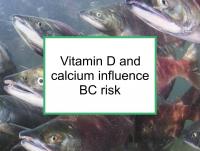A new study has reported that relatively high vitamin D and calcium intakes both are associated with modestly reduced breast cancer risk. Findings of previous studies have been inconsistent. The present study included 1,803 breast cancer cases and 3,606 cancer-free controls matched by age and menopausal status.
However, when the analysis was performed according to the menopausal status of the study participants, the reduced risk conferred by vitamin D was found only among premenopausal women and the reduced risk association with calcium intake was found only among postmenopausal women.
Study results might not apply to U.S. women
While the study results are similar to some U.S. and European findings, they should be viewed with caution since the Japanese diet is very dissimilar to the typical Western diet. For example, U.S. women typically derive much more of their calcium from dairy products and less of it from vegetables than Japanese women. In addition, Japanese women normally derive more vitamin D from their diets due to their high fish consumption, whereas U.S. women are often deficient in vitamin D.
Increasing Vitamin D also associated with lower risk
Vitamin D appears to be an integral part of breast cancer development and progression, but the relationship is not fully understood. Below, we summarize recent findings with respect to vitamin D and risk of breast cancer in Western populations:
- A 2009 meta-analysis of 36 studies concluded that there was a significant inverse relationship between vitamin D intake and risk of breast cancer. Also found was a significant decrease in risk of breast cancer for those with the highest calcium consumption
- A large Swedish prospective study found no significant relationship between risk of breast cancer and sun exposure variables, including annual number of sunburns, skin sun sensitivity, time spent on sunbathing vacations, or solarium use at any age of exposure. There was also no association found between breast cancer incidence and dietary vitamin D intake or supplementary multivitamin use
- A Canadian case-control study found that while vitamin D intake was most strongly associated with lower risk of hormone receptor positive (ER+/PR+) breast cancer, it also appeared to be associated with lower risks of hormone receptor negative (ER-/PR-) and mixed receptor status (ER+/PR-) tumors
- An Italian study found that risk of breast cancer was significantly lower for women in the top three tenths of vitamin D intake than those in the bottom three tenths. In fact, no protection was found for vitamin D up to the seventh decile of intake. The inverse association between high intake of vitamin D and breast cancer was consistent regardless of menopausal status
- A study of women with at least one first degree or second degree relative with breast or ovarian cancer found that breast density was inversely associated with vitamin D intake. High breast density has been found to be associated with increased risk of breast cancer
- A Canadian case-control study found that increasing sun exposure during ages 10 to 19 was associated with lower subsequent risk of breast cancer. Reduced risk was also found for cod liver oil consumption and increasing milk intake. Weaker evidence was found for associations between ages 20 and 29 and none between ages 45 and 54. The authors concluded that vitamin D exposure earlier in life, particularly during breast development, may be most relevant.
Since milk and butter have been found to be associated with higher risk of breast cancer in adult women, we suggest obtaining calcium from other sources, including the following:
